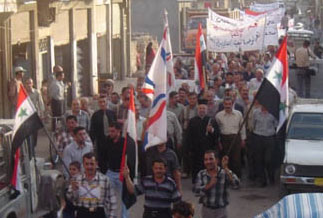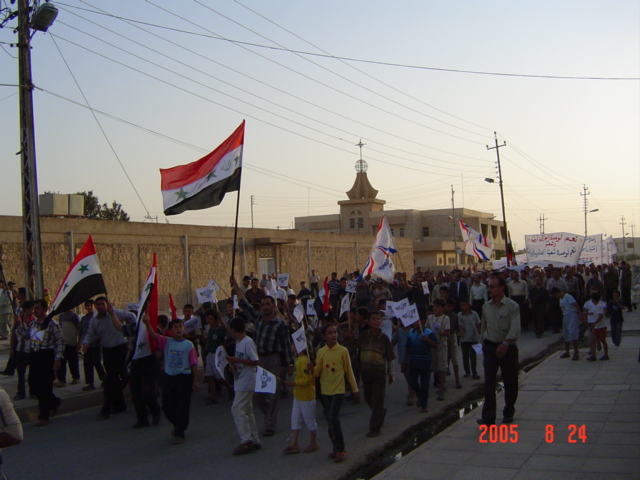

 (AINA) -- Opposition to the Iraqi draft constitution by Assyrians (also known as Chaldeans and Syriacs) continues to intensify. In a strongly worded statement (AINA, 9-4-2005) issued last week, the Assyrian Democratic Organization (ADO), labeled the draft constitution "a great disappointment and blow to the ambitions of the Chaldean Assyrian Syriac people." The statement followed a series of protests (AINA, 8-24-2005) against the draft constitution by Assyrians in Bartilla, Baghdeda, Qaraqosh and Telesqop on August 24.
(AINA) -- Opposition to the Iraqi draft constitution by Assyrians (also known as Chaldeans and Syriacs) continues to intensify. In a strongly worded statement (AINA, 9-4-2005) issued last week, the Assyrian Democratic Organization (ADO), labeled the draft constitution "a great disappointment and blow to the ambitions of the Chaldean Assyrian Syriac people." The statement followed a series of protests (AINA, 8-24-2005) against the draft constitution by Assyrians in Bartilla, Baghdeda, Qaraqosh and Telesqop on August 24.
According to the ADO, the main points of contention were the lack of recognition of Assyrians as the indigenous people of Iraq and the lack of mention of Assyrians as "one of the components of the Iraqi people." Moreover, the ADO complained that the constitution failed to mention any of the non Islamic religions including "Christianity, Sabaeanism (Mandeanism), and Yezidism as religions that existed and preceded Islam in Iraq." Most noteworthy was the division of Assyrians in the constitution's Article 135, which "...divides the Assyrians by inserting the dividing conjunction AND between the designations 'Chaldeans' AND 'Assyrians'" and, "the three known designations Chaldean, Assyrian, Syriac have been used interchangeably during the course of Assyrian history."
The ADO statement criticized the leaders of the various Churches who "dispatched one memorandum after another...demanding each designation be mentioned separately," as well as referring to some Kurdistan Democratic Party (KDP) sponsored "extremist organizations in Iraq and the Diaspora, whose...memorandums filed to the Iraqi authorities rejecting the unifying name have marginalized the Assyrians and compromised their unity."
Most noteworthy, though, was the criticism of the Assyrians in the Iraqi National Assembly and the Constitution Drafting committee "who failed in their efforts to preserve the unity of the Assyrians; they should have withdrawn from the committee in protest."
The strong public criticism of Assyrian representatives marks a dramatic shift by Assyrians inside and outside Iraq who had previously agreed to not further undermine an already weakened and tenuous presence in the Iraqi political process.
Of the six representatives in the National Assembly, four were appointed by the KDP for the sole purpose of ensuring a division of Assyrians along various community and Church designations as well as erasing calls for an Assyrian self-administered area. However, the criticism is more far reaching and also targets Ayad Alwai's party as well as the Assyrian Democratic Movement (ADM) representative, Mr. Yonadam Kanna, who also sat on the constitution committee.
The criticism by the ADO is especially poignant because the ADO, along with the ADM, was a cosponsor of the Baghdad Conference of October 2003, titled The Chaldean Syriac Assyrian Conference, where the various communities agreed to use the unifying term of ChaldoAssyrian to refer to all of the communities singly. The unifying term was successfully incorporated into the Transitional Administrative Law (TAL, English, Arabic) but was successfully removed from the constitution after a major push by, what many believe to be, the work of the KDP. Referring to KDP warlord Masoud Barzani, one observer noted "The KDP leadership has calculated that its dreams of a greater Kurdistan are directly linked to the division of the Assyrians into smaller demographically less significant competing groups. The name issue provided the KDP the fuel to drive the wedge into the heart of the Assyrian national agenda."
 Assyrians throughout the northern Iraqi Nineveh plain held large protests on August 24 in opposition to the draft constitution precisely on the point of the division into Chaldeans AND Assyrians. The protests were organized by many community leaders, including the ADM, and were joined by pro-unity clergy from the Syriac Catholic and Chaldean Churches in the Nineveh Plain -- the ancient Assyrian heartland. Immediately after the protests, the KDP leadership is believed to have called for a "shaking up" of the Assyrian Christians. One day later, two Assyrians were shot twice in the head by KDP gunmen (AINA, 8-27-2005). One week earlier, a Shabak minority demonstration was shot at by KDP paramilitary forces (AINA, 8-16-2005). The Kurdish KDP militia, Peshmarga, has grown richer and more brutal. Former DIA/CIA counter-terrorism officer Philip Giraldi reports in the September 12th issue of The American Conservative, "Meanwhile, the disproportionate number of Kurds in the Defense Ministry is diverting funds and equipment to peshmerga militia units preparing to seize Kirkuk".
Assyrians throughout the northern Iraqi Nineveh plain held large protests on August 24 in opposition to the draft constitution precisely on the point of the division into Chaldeans AND Assyrians. The protests were organized by many community leaders, including the ADM, and were joined by pro-unity clergy from the Syriac Catholic and Chaldean Churches in the Nineveh Plain -- the ancient Assyrian heartland. Immediately after the protests, the KDP leadership is believed to have called for a "shaking up" of the Assyrian Christians. One day later, two Assyrians were shot twice in the head by KDP gunmen (AINA, 8-27-2005). One week earlier, a Shabak minority demonstration was shot at by KDP paramilitary forces (AINA, 8-16-2005). The Kurdish KDP militia, Peshmarga, has grown richer and more brutal. Former DIA/CIA counter-terrorism officer Philip Giraldi reports in the September 12th issue of The American Conservative, "Meanwhile, the disproportionate number of Kurds in the Defense Ministry is diverting funds and equipment to peshmerga militia units preparing to seize Kirkuk".
Some have chided the Assyrian leaders including that of the ADM for not standing for the principles elucidated in the Chaldean Syriac Assyrian Conference in Baghdad in 2003. The protests by grassroots ADM members as well as the statement of opposition by the ADO has proven to be an embarrassment of sorts. Referring to the four Assyrians assigned by the KDP slate, one analyst noted "we knew what the Kurdish representatives' position would be, but we had hoped for a principled stance from our only independent representative to show the international community that Assyrian Christians had once again been marginalized."
Others have explained the decision to support the draft constitution in the context of an overwhelming KDP political presence as well as threat of violence and added "perhaps this was the best that could be hoped for under duress and threat of assassination." Another observed "with the assassination of Francis Shabo, as well as kidnappings, beheadings, and the two recent shootings, it is no wonder our leadership is a little skittish."
The atmosphere of violence in which Assyrian leaders must work has raised serious doubts about the legitimacy of the political process in Iraq. One observer commented "our leaders have been forced to sign under duress. We, as a people, cannot accept this process or its end-result -- the draft constitution." Another analyst likened Iraqi minority leaders and their communities to hostages, saying "they are surrounded, threatened, and pressured as though they were hostages. Fellow Assyrian Christians are beaten and murdered as examples. Our accepting these decisions under threat is like abandoning hostages to fend for themselves and secure their own release from their kidnappers."
Assyrians have heavily invested in forging a new, secular, democratic, and pluralistic Iraq. Many recognize that failure of the constitution may further spiral the country into chaos and insecurity that may disproportionately impact vulnerable minorities. However, for most Assyrians, a constitution that formally divides the people into demographically insignificant and competing groups to satisfy expansionist KDP ambitions while neglecting the need for an administered area is unacceptable. The last remaining hope for Assyrians is to vigorously oppose the draft constitution alongside other disenchanted minorities in the upcoming 10/15 referendum.
A two-thirds majority in only three provinces is required to defeat the draft constitution and schedule new elections for a new National Assembly to begin the drafting process anew. One Assyrian leader summarized, "thanks to the KDP's election box theft (AINA, 1-31-2005), we, along with hundreds of thousands of others, were not properly represented in this Assembly. A new National Assembly and a new constitution is the best chance for democracy in Iraq."

or register to post a comment.